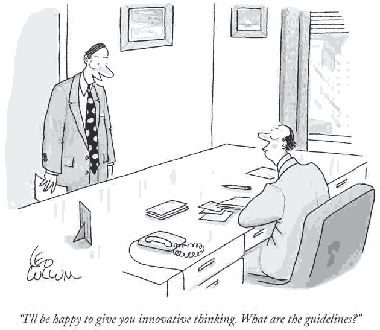Summary | Excerpt | Reviews | Beyond the Book | Readalikes | Genres & Themes | Author Bio

Critics' Opinion:
Readers' Opinion:
First Published:
Mar 2007, 408 pages
Paperback:
Dec 2008, 408 pages
 Book Reviewed by:
Book Reviewed by:
BookBrowse Review Team
Buy This Book
An anecdote about Max Planck, the Nobel Prize–winning physicist,
hammers home this reality. When a graduate student approached
him for a topic of research for his Ph.D. thesis, asking him for a problem
he could solve, Planck reportedly scoffed: “If there was a problem I
knew could be solved, I would solve it myself!”

© The New Yorker Collection 2005 Leo Cullum from cartoonbank.com.
All Rights Reserved.
Induction and deduction only extend existing knowledge. A radically
new conceptual system cannot be constructed by deduction. Rational
thought can be applied only to what is known. All new ideas
are generated with an irrational element in that there is no way to predict
them. As Robert Root-Bernstein, physiology professor and author
of Discovering, observed, “We invent by intention; we discover
by surprise.”9 In other words, accidents will happen, and it’s a blessing
for us that they do.
The Receptive Scientific Mind
“Accident” is not really the best word to describe such fortuitous discoveries.
Accident implies mindlessness. Christopher Columbus’s discovery
of the American continent was pure accident — he was looking
for something else (the Orient) and stumbled upon this, and never
knew, not even on his dying day, that he had discovered a new continent.
A better name for the phenomenon we will be looking at in the
pages to follow is “serendipity,” a word that came into the English
language in 1754 by way of the writer Horace Walpole. The key point
of the phenomenon of serendipity is illustrated in Walpole’s telling of
an ancient Persian fairy tale, The Three Princes of Serendip (set in the
land of Serendip, now known as Sri Lanka): “As their highnesses traveled,
they were always making discoveries, by accidents and sagacity,
of things they were not in quest of.”
Accidents and sagacity. Sagacity — defined as penetrating intelligence,
keen perception, and sound judgment — is essential to serendipity.
The men and women who seized on lucky accidents that
happened to them were anything but mindless. In fact, their minds
typically had special qualities that enabled them to break out of established
paradigms, imagine new possibilities, and see that they had
found a solution, often to some problem other than the one they were
working on. Accidental discoveries would be nothing without keen,
creative minds knowing what to do with them.
The term “serendipity” reached modern science by way of physiologist Walter B.
Cannon, who introduced it to Americans in his 1945
book The Way of an Investigator.11 Cannon thought the ability to seize
on serendipity was the mark of a major scientist. The word is now
loosely applied in the popular media to cover such circumstances as
luck, coincidence, or a fortunate turn of events. This sadly distorts it.
Serendipity means the attainment or discovery of something valuable
that was not sought, the unexpected observation seized upon and
turned to advantage by the prepared mind. The key factor of sagacity
has been lost. Chance alone does not bring about discoveries. Chance
with judgment can.
Serendipity implies chance only insofar as Louis Pasteur’s famous
dictum indicates: “In the field of observation, chance favors only the
prepared mind.” Salvador Luria, a Nobel laureate in medicine, deemed
it “the chance observation falling on the receptive eye.” I have the answer.
What is the question? Turning an observation inside out, seeking
the problem that fits the answer, is the essence of creative discovery.
Such circumstances lead the astute investigator to solutions in search
of problems and beyond established points of view.
Excerpted from Happy Accidents by Morton Meyers, M.D. Copyright © 2007 by Morton Meyers, M.D. Excerpted by permission of Arcade Publishing. All rights reserved. No part of this excerpt may be reproduced or reprinted without permission in writing from the publisher.





The Flower Sisters
by Michelle Collins Anderson
From the new Fannie Flagg of the Ozarks, a richly-woven story of family, forgiveness, and reinvention.

The House on Biscayne Bay
by Chanel Cleeton
As death stalks a gothic mansion in Miami, the lives of two women intertwine as the past and present collide.

The Funeral Cryer by Wenyan Lu
Debut novelist Wenyan Lu brings us this witty yet profound story about one woman's midlife reawakening in contemporary rural China.
Your guide toexceptional books
BookBrowse seeks out and recommends the best in contemporary fiction and nonfiction—books that not only engage and entertain but also deepen our understanding of ourselves and the world around us.